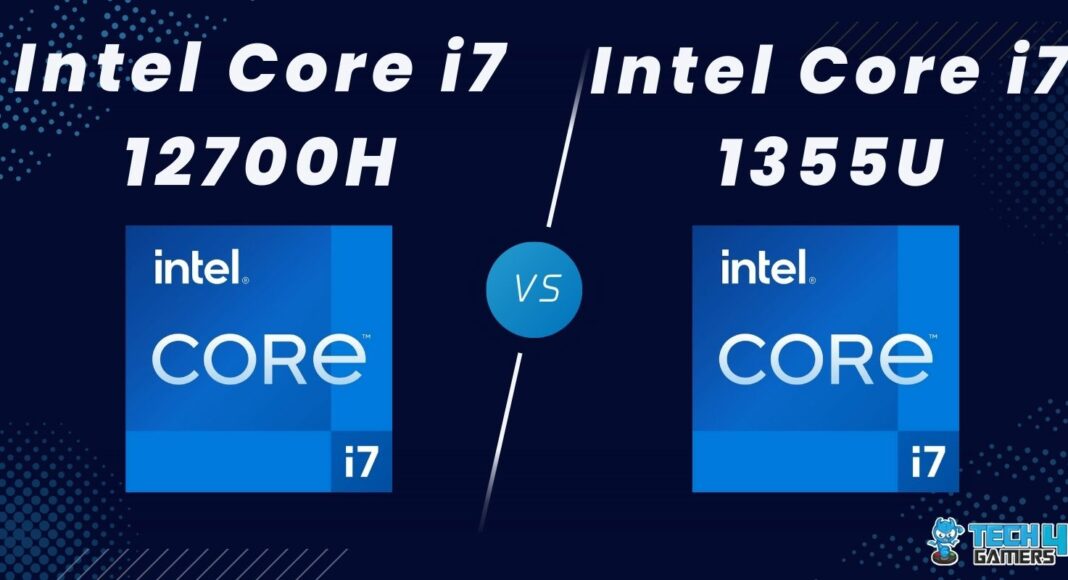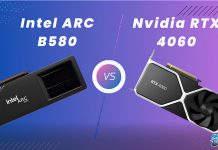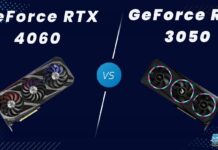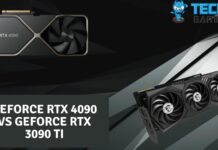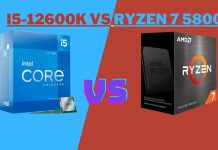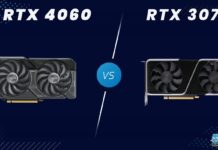Intel Core i7 1355U
Rated: 8/10
Intel Core i7 12700H
Rated: 7.5/10
Pros And Cons
| CPU | Pros | Cons |
|---|---|---|
| Core i7 1355U | ✅Lower power draw ✅More recent | ❌Significantly worse performance |
| Core i7 12700H | ✅Significantly better performance | ❌Worse power draw ❌Slightly older |
- In our performance testing, the Core i7 12700H had around 37% more power than the 1355U, which makes it more suited to heavy users. This is not to say that the 1355U performed badly; both processors just target different demographics.
- However, it’s essential to note that the H-series chip’s power draw was more than double that of the 1355U, indicating a trade-off between performance and power efficiency.
- While the Core i5 1355U was designed for thin and light laptops, the 12700H was crafted with a focus on productivity and gaming laptops, catering to different usage scenarios and priorities.
Comparison Table
| CPU | Intel Core i7 1355U | Intel Core i7 12700H |
|---|---|---|
| Core Architecture | Intel Raptor Lake-U | Intel Alder Lake-S |
| Processing Node | 10nm | 10nm |
| Number of Cores | 2 performance 8 efficiency | 6 performance 8 efficiency |
| Number of threads | 12 | 20 |
| L3 Cache | 12MB | 24MB |
| Base Clock Speed | 1.20GHz | 1.70GHz |
| Boost Clock Speed | 5.00GHz | 4.70GHz |
| Thermal Design Power | 15W | 45W |
| Integrated Graphics | Intel Iris Xe Graphics G7 96EUs | Intel Iris Xe Graphics G7 96EUs |
| Recommended Consumer Price | $469 | $502 |
Architectural Differences
- Core Count: The 12th-gen processor features 6 performance cores and 8 efficiency cores, totalling 20 threads, while the 1355U has matching efficiency cores and only 2 performance cores, resulting in 12 threads.
- Clock Speeds: Surprisingly, the 1355U has a higher boost frequency than its older cousin. It has a base clock of 1.20GHz, which can boost up to 5.00GHz. In contrast, the 12700H has a base frequency of 1.70GHz, which can boost up to 4.70GHz.
- Thermal Design Power: The 1355U has a modest TDP of 15 watts, whereas the 12700H has a three times larger TDP of 45 watts.
- L3 Cache: The 12700H also doubles the amount of L3 cache from the 1355U, upgrading its 12MB to 24MB.
- Lithography: Amongst the sea of differences between these two processors, they are based on the same 10nm manufacturing process.
Though people think Moore’s law is dead, the recent technological innovation is giving CPUs substantial boosts in performance year over year. To test the extent of this boost, we decided to compare the Core i7 1355U vs Core i7 12700H, read along to find our results!
Core i7 1355U Vs Core i7 12700H: Performance Benchmarks
Now that we’ve gotten the hardware specifications of these processors out of the way, it is time to move on to the performance benchmarks.
Note: The performance results presented in this comparison are based on testing a range of laptops with these processors and may not reflect the exact performance of your own device. However, you can use these numbers to compare the performance difference between the two chips.
Cinebench R23
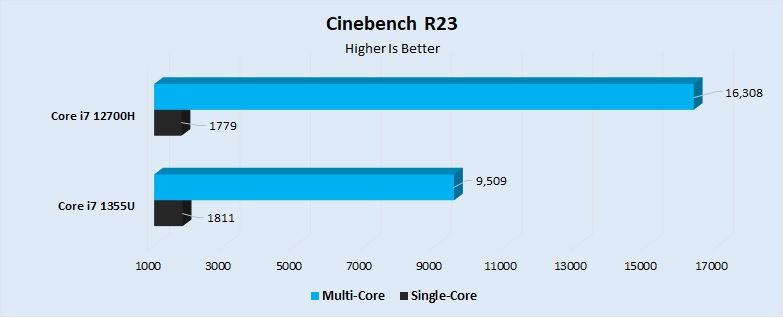
- The i7 1355U kicks off this comparison with a 2% lead of performance compared to the 12700H in terms of single-core performance in Cinebench R23. The newer chip scored 1811 points, whereas the 12th gen processor scored 1779 points.
- As expected, the 12700H bested its younger cousin in terms of multi-core performance by quite a large margin of 72%. The 12700H had a performance of 16308 points, whereas the 1355U had a performance of 9509 points.
Geekbench 5.4
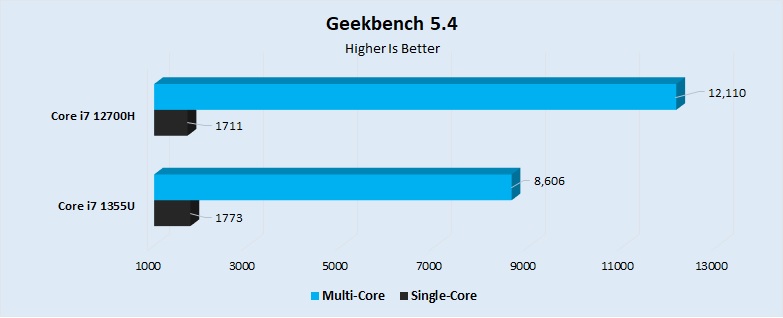
- The findings of our previous test were confirmed in Geekbench, with the 1355U having a 2% lead again against the single-core performance of the 12700H. It scored 1773 points, whereas the 12700H had a lower score of 1711.
- The multi-core score of this test also affirmed our previous findings; the 12700H was 41% ahead of 1355U. The more powerful chip scored 12110 points, whereas the 1355U had a score of only 8606 points.
7-Zip
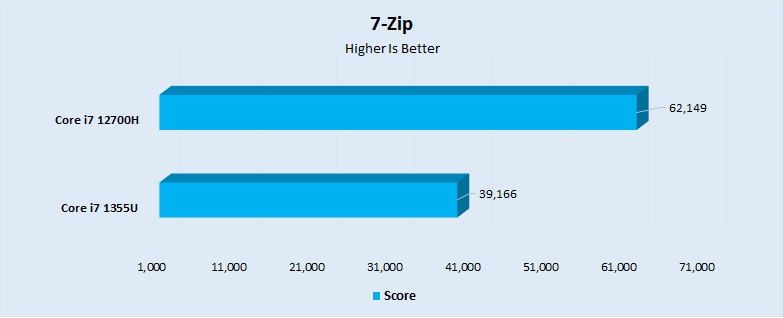
- The multi-threaded run of 7-Zip benefited from the extra horsepower offered by the cores of the 12700H, giving it a 59% advantage over the more recent processor in this test.
- The 12700H had a great performance of 62149 points, whereas the 1355U was a lot more modest with a score of 39166 points.
HWBOT x265
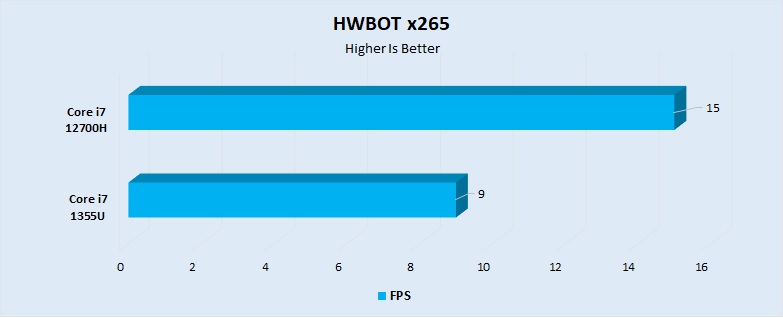
- This test also confirmed that more cores equal more performance for the 12700H, giving it a 64% leverage over the 1355U.
- The 1355U had an output of 9 FPS on the 4k preset, whereas the test ran smoother on the 12700H, giving an output of 15 FPS.
Blender
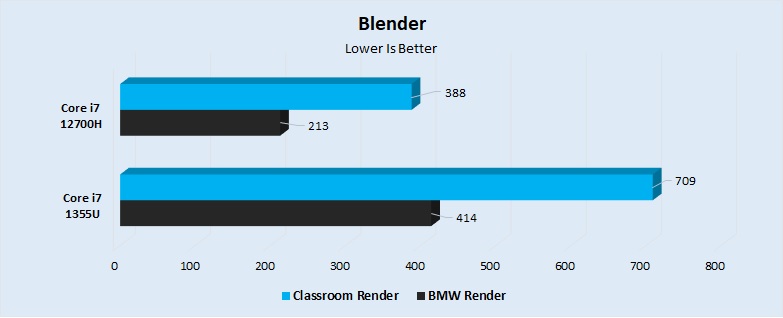
- The Classroom render in Blender concluded 82% faster on the 12th-gen processor, completing in 388 seconds compared to the 709 seconds it took on the 13th-gen 1355U.
- The BMW render finished about twice as soon on the 12700H compared to the 1355U. It took 213 seconds on the H-series chip, whereas the 1355U took about 414 seconds to render.
3DMark 11
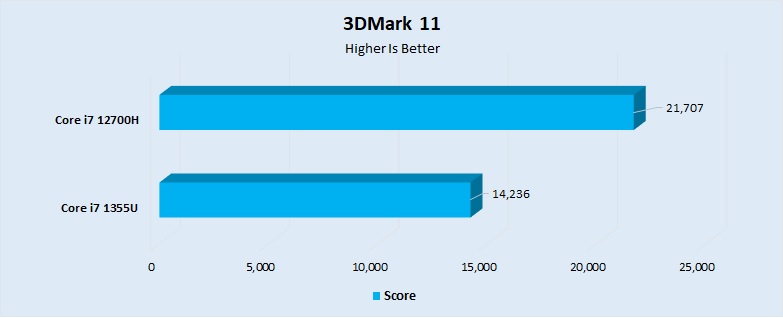
- The whitewash in performance continued in 3DMark 11, where the 12700H was about 49% more performant than its U-series cousin.
- The lower-powered chip had a performance of 14236 points, whereas the 12700H had a performance of 21707 points.
FP32
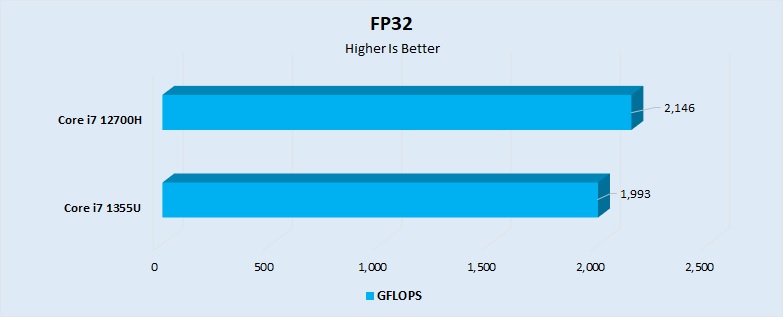
- The higher power budget for the processor on the 12700H translates to its iGPU also performing 7.5% better than the 1355U.
- According to our FP32 test, the iGPU on the 1355U had a performance of 1993 GFLOPS, whereas the 12700H had a performance of 2146 GFLOPS.
Power Consumption
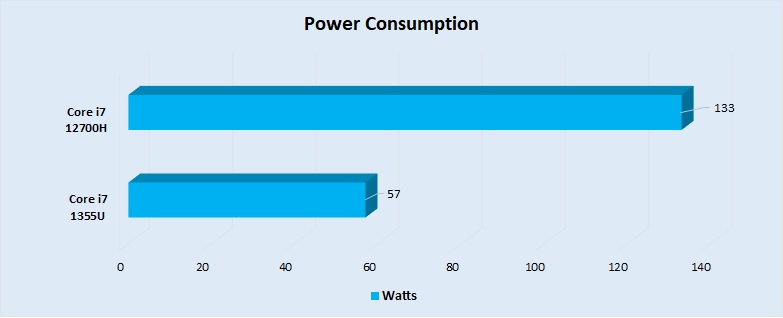
- As expected, the 12700H had to pay a price for its better performance. It drew over 2 times the power of the 1355U in our Cinebench R15 test with an external monitor.
- The 1355U had a power consumption of about 57 watts, whereas the 12700H had a power consumption closer to 133 watts.
Core i7 12700H Vs Core i7 1355U: Which One Should You Go For?
Core i7 1355U: If you prioritize battery life and your usage is not particularly demanding, the Core i7 1355U is a suitable choice. Crafted with thin and light devices in mind, it delivers ample performance for everyday tasks.
Core i7 12700H: On the other hand, the Core i7 12700H is a superior option for heavy users, often found in more powerful machines. It caters to users with intensive computing needs, even though it may impact battery life.
The Core i7 12700H and Core i7 1355U are vastly different processors stuck with the same first name, both having very distinct user bases. If you want good performance on the go with great battery life, the 1355U is the processor for you. If your usage entails heavier tasks, go for the 12700H.
More From Core i7 12700H
More From Core i7 1355U
Thank you! Please share your positive feedback. 🔋
How could we improve this post? Please Help us. 😔
[Hardware Reviewer]
Hi! I’m Ali Tauseef, and I have been writing for Tech4Gamers since 2022. I love all things computer hardware but am particularly fond of CPUs and motherboards, and I like to stay up-to-date about the latest advancements in these worlds, and when possible, write about it. When I’m not doing that, I like to get into a little FPS action in CS2 or get lost in the vast world of RDR2.
Get In Touch: ali@tech4gamers.com


